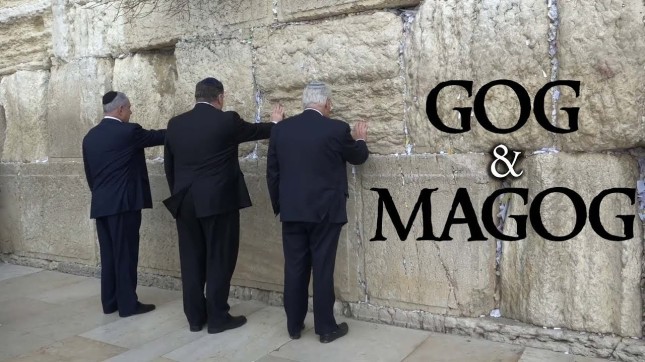
from Google Images
After the thousand years was complete, or in other words, after the millennium, the dragon was to be released (Revelation 20:5, 7). So, immediately after his release from prison or from the bottomless pit, the very first thing on his agenda was to deceive the nations (Revelation 20:8), at which time the Battle of Gog and Magog occurs. Most Bible students believe the nations refer to the gentiles—i.e. all nations except for the Jews. However, as I explained in a previous study[1] the nations in this context refers to the tribes of Israel or the lands of the Jews. So the dragon immediately began deceiving the Jews. If this is so, who is Gog and what is the land of Magog, and when does Gog arise to make war? The text clearly concludes that the battle or war occurs after the millennium, which, from a dispensational and premillennial worldview, gives rise to questions about the success of the so-called millennial reign of Christ:
“It is amazing that mankind can be led into rebellion after a 1,000 reign of Christ! Were these nations “unbelievers” or “initially believers?” Is Christ’s presence and reign not able to effect permanent change in human society? (Commentary on Revelation 20:8 by Dr. Bob Utley)
Moreover, Ezekiel clearly shows that this battle or war occurs in the latter days:
Ezekiel 38:8 “After many days you shall be visited: in the latter years you shall come into the land that is brought back from the sword… 16 …you shall come up against my people of Israel, as a cloud to cover the land; it shall be in the latter days…” (emphasis mine)
Furthermore, this agrees with ancient Jewish eschatology:
“In the rabbinical writings Gog and Magog appear as the enemies of the Messiah.” (Robertson’s Word Pictures; see also the Babylonians Talmud, Sanhedrin 17a).
See also Clarke’s Commentary on Revelation 20:8, in which he quotes for the Targum Jonathan:
“…in the last days, and shall gather the kings together, and leaders clothed with armor, and all people shall obey them; and they shall wage war in the land of Israel against the children of the captivity, but the hour of lamentation has been long prepared for them, for they shall be slain by the flame of fire which shall proceed from under the throne of glory, and their dead carcasses shall fall on the mountains of the land of Israel; and all the wild beasts of the field, and the wild fowl of heaven, shall come and devour their carcasses; and afterwards all the dead of Israel shall rise again to life…”
Therefore, the prophet Ezekiel and ancient Jewish eschatology agree that the battle / war of Gog of the land of Magog occurs in the latter days or in the last days. Moreover, the phrase: “their dead carcasses shall fall on the mountains of the land of Israel; and all the wild beasts of the field, and the wild fowl of heaven, shall come and devour their carcasses” sounds a lot like the Marriage Supper of the Lamb (Revelation 19:9), which immediately follows the battle the Messiah, the King of kings, wages in Revelation 19:17-18. There the fowls of the air are called to eat the flesh of kings, captains and mighty men etc. So, if the War of Gog and Magog is the same war waged by the King of kings, the millennium could not have lasted for a literal thousand years. It must have been a far shorter period of time.
In other words, a problem exists for futurists who have the point of view that when the return of Christ occurs, he immediately initiates a literal one thousand years of peace. One cannot have the war of Gog and Magog occur both before and after the millennial period (viz. the war in Revelation 19 clearly seems to be the same as the war of Revelation 20:8). Moreover, if the war occurs after the millennial period, as the text clearly concludes it does, it cannot occur in the last days, if the last days occur immediately prior to the Second Coming of Jesus, and if his coming occurs before the millennium! Yet, Ezekiel (and the ancient rabbis agree) the war of Gog and Magog occurs in the latter days. Thus, Scripture concludes both the return of Christ and the war of Gog and Magog occur in the last days (or latter days). Nevertheless, such a thing is impossible according to premillennial eschatology. So, is the word of God wrong (cp. John 10:35), or is premillennial eschatology wrong (Isaiah 8:20; John 10:35)?
____________________________________________
[1] See my study: The Millennium, a Period of Evaluation.